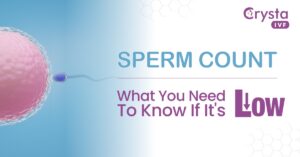The secret to living a long life is happiness! Everyone, whether in the initial phase of their life, about to get married, or planning for a baby, has the ultimate goal of living the happiest life possible. But things do not always go as planned; sometimes, we all witness a personal or professional failure. And due to the modern lifestyle and the technologically driven world, cases of infertility are rising day by day, not to mention other reproductive complications too.
To successfully conceive a baby, you need a fertilized egg (a combination of healthy semen and an egg), and for healthy sperm, the minimum required parameters of healthy sperm should be met. So, let’s comprehend the factors needed for healthy sperm and how you can boost your semen’s health. Get started now!
Significant Factors to Analyze for Healthy Sperm
Sperm Density
Sperm density refers to the calculated number of sperm present per unit of the sperm sample and is synonymous with sperm count. An average sperm count is defined as anything above 15 million/ml. While if you have a lower sperm count than the mentioned number, it is identified as a decreased sperm count and medically referred to as “oligozoospermia,” and the total amount of sperm in semen is called azoospermia.
Thus, to confirm the azoospermia condition or the absence of sperm in the sperm, the sample should be examined under a microscope after centrifugation. To determine normal semen volume, men diagnosed with azoospermia should be evaluated for ejaculatory duct obstruction and hormonal irregularities. Also, a post-ejaculatory urine sample should be examined for sperm because, in some conditions, sperm travels backward into the urinary bladder instead of coming out from the tip of the penis during ejaculation.
Quality of Sperm
Sperm is usually found to be thick in consistency. Within 5–25 minutes of ejaculation, it naturally appears to be thin and flowy-smooth in consistency. The liquid phase of sperm takes place due to enzymes added by the prostate. The ideal change in semen consistency is tested by pouring the semen drop by drop.
If the semen is thin and flowy in consistency following ejaculation, the chances are higher that ejaculatory duct obstruction or the absence of seminal vesicles will be considered. On the other hand, too-thick semen fails to dilute and can cause male infertility as it does not meet the parameters of healthy sperm.
Volume of Sperm
Sperm volume is one of the essential parameters of healthy semen. The normal sperm volume ejaculated during an orgasm is around 1.5ml to 5ml.
A decrease in semen volume may result from retrograde ejaculation, congenital abnormalities or absence of seminal vesicle, neurological problems, hormonal imbalance, etc. Only in minor cases, the Sperm volume is found to be significant due to contamination by urine. However, the semen volume may vary in the same man on different occasions. And is noticed if the interval period between ejaculations is short.
Sperm Motility
The sperm moves with the help of the tail of the sperm, and it usually moves at a speed of 1 mm/min to 4 mm/min. And to swim freely, the normal motility of the sperm is essential for sperm transportation through the female genital tract and successful fertilization of the ovum. The grading of sperm motility for sperm analysis is as follows:
- Grade 0: refers to no movement.
- Grade 1: Sluggish movement
- Grade 2: Slow but not straight movement
- Grade 3: Movement in a Straight Line
- Grade 4: Qualifies at best with terrific speed
If more than 60% of the sperm in a semen sample tested show normal motility, it is considered normal. Abnormal motility occurs in men with testicular infections, partial duct obstruction, or structurally abnormal sperm.
Morphology of Sperm
Sperm morphology refers to the anatomical aspects of sperm, like its size and shape. Various parts of sperms, such as the head, acrosome, mid-peace, tail, etc., are studied in detail under a phase contrast microscope.
Normal sperms have smooth oval heads and are 3-5 micrometers long and 2-3 micrometers wide. Mature sperms contain a few droplets of cytoplasm in the mid-peace, and excessive retained cytoplasmic droplets are abnormal.
Sperm cell count
The sperm is examined for various cell types present in it. In normal conditions, a semen sample lacks any type of blood cells. A large number of white blood cells may be present in the sperm if any infection or inflammatory process occurs in the genital tract. On microscopy, the sperm and white blood cells may both appear round. If more than 5-10 round cells are present on microscopic examination of the sperm sample, the immuno-histochemical staining technique is performed to differentiate between sperm and white blood cells.
Sperm biochemical analysis
Biochemical analysis of semen involves testing zinc, citric acid, acid phosphatase, alpha-glucosidase, etc. And each ejaculation normally contains around 2.4 moles of zinc; if these zinc levels are low, the test may be repeated. Your repeatedly low zinc level in the ejaculate suggests prostatic dysfunction or ductal obstruction. While fructose levels in each ejaculation should be around 13 micromoles, low levels of fructose in the ejaculation may be suggestive of obstruction, dysfunction, or the absence of seminal vesicles. Long in short, your glucosidase should usually be>20 mill units per ejaculation.
Test for anti-semen antibody
Sperm contains various unique antigens not recognized by the body’s immune system. This results from an intact blood-testis barrier; under normal circumstances, anti-sperm antibodies are absent. However, in any case, if the blood test barrier is breached due to infection, testicular trauma, vasectomy, torsion of the testis, etc., anti-sperm antibodies may develop. So, if your sperm tests are positive for anti-sperm antibodies, male infertility can result and may fail the updated parameters of healthy sperm.
Semen quality plays a significant role in determining your fertility condition, so if you are facing any issues, it is always better to consult your healthcare provider and follow the tips on boosting your semen quality.
Tips to Boost Your Sperm Quality
- Maintain a healthy weight.
- Eat a balanced diet.
- Manage your stress levels.
- Quit alcohol
- Avoid tobacco
- Watch out for toxins.
- Avoid lubricants during sex.
- Prevent sexually transmitted infections (STIs).
In the end, comprehending the minimum parameters of healthy sperm is essential for individuals and couples trying to conceive. By evaluating key indicators such as sperm count, motility, morphology, volume, pH level, and vitality, we can gain insights into male reproductive health. If you are still concerned about your semen parameters, consulting an IVF specialist can provide guidance and support. Remember, knowledge about sperm health empowers individuals and contributes to overall reproductive well-being. So it is better to connect with a fertility expert; you have to scroll down a little more.
Book an Appointment with an IVF Expert!
No worries if you have faced infertility complications for many years; with the help of technology in healthcare, you can overcome any obstacle in your life. So, keep hope and connect with the top-notch fertility expert at the best IVF Centre in Kanpur to start your parenthood journey immediately. Here, the team of experts ensures you get a personalized approach to discussing all your fertility issues so that the necessary steps can be taken at the right time.




